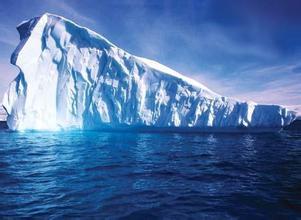Greenland is not only the world's largest island, it's also one of the least hospitable.
格陵兰不仅是世界上最大的岛也是最荒凉的地方之一。
80 percent of the island is blanketed by a massive layer of ice.
岛上百分之八十的地方被厚厚的冰层覆盖。
The Greenland ice cap covers 1.7 million square kilometers and is over a kilometer deep.
格陵兰冰盖覆盖面积达一百七十万平方公里,深度达一公里多。
Under sufficient pressure, ice flows.
在足够的压力之下,冰就会流动。
Greenland's rivers of ice, glaciers, are accelerating, perhaps because of rising temperatures.
格陵兰的冰川移动速度正在加快可能是缘于气温的升高。
Some of them hit speeds of 20 meters a day as they move towards the coast.
在向海岸移动的过程中有些冰川的速度已达到每天二十米。
Here the glaciers shatter and claps into the sea.
冰川在此碎裂翻入海中。
Few creatures can survive in this violent landscape.
很少有生物能在这样激烈的环境下生存。
But one has become an expert.
不过,有一种生物却成了专家。
The polar bear is the world's largest land predator.
北极熊是世界上最大的陆生掠食者。
But it mainly hunts on the ice using shifting floes to stalk seals.
但它主要在冰上捕猎靠漂浮的冰块追踪海豹。
It is believed polar bears are descended from brown bears that became isolated by ice glaciers around the time the ice sheet began to form.
据说北极熊是由棕熊演变而来的,大概是冰原开始形成时期被冰川隔离的。
A series of evolutionary changes have allowed them to thrive.
经过一系列的进化而繁荣起来。
White fur provides camouflage, while their massive bulk and a layer of fat insulate them in freezing water.
白色的毛是一种伪装,而硕大的身躯和脂肪层可使其在冰冷的水中保持体温。
They can smell prey up to 40 kilometers away and rip it apart with their sharp teeth and claws.
它们能在四十公里开外就嗅到猎物并用尖牙利爪将其撕碎。
For such a powerful hunter, the polar bear lives a precarious existence.
然而就是这样强大的猎手其生存却充满了不确定性。
It's survival depends on regular movements of ice and prey.
因为要依赖于冰和猎物的规律性移动。

But bears aren't the only giants here.
熊并不是这里唯一的巨人。
Remnants of the crumbling ice sheet litter the seas.
冰原碎裂后零乱地飘浮在海上。
In recent years, icebergs are becoming more numerous.
近年来,冰山数量在增多。
Some are huge.
有些非常巨大。
In 2010, a chunk of ice measuring over 250 square kilometers sheered off from the glacier and headed out to sea.
2010年,一块两百五十平方公里的大冰块从冰川上脱离下来飘入大海。


